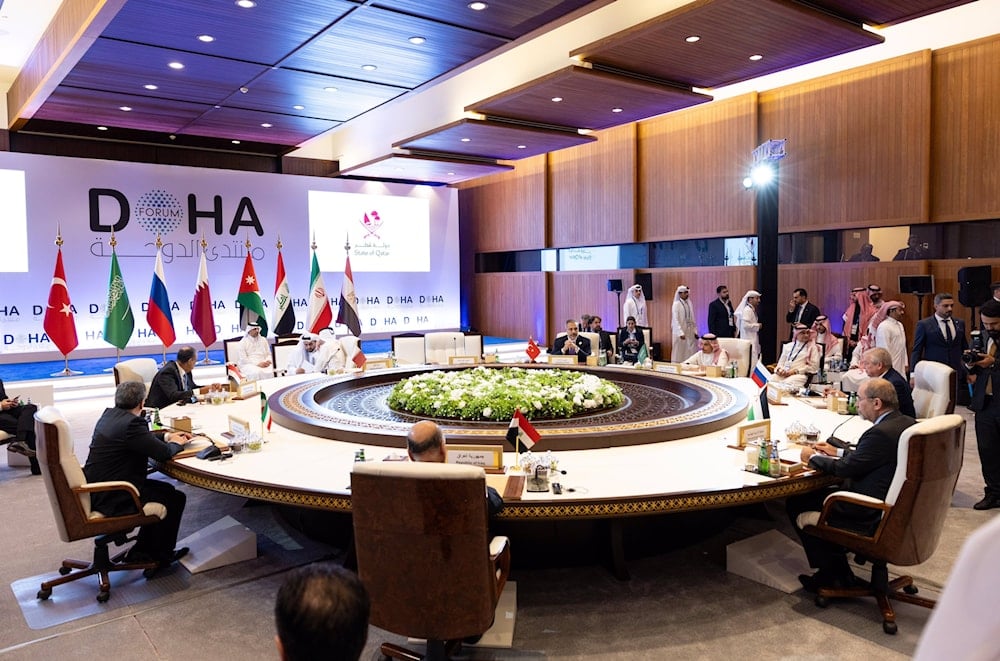Arab and Astana Process foreign ministers call for political solution
Members of the declaration described the continuation of the Syrian crisis as a significant threat to regional and international security.
-

Members of Arab countries and the Astana Process (Agencies)
The Foreign Ministers of several Arab countries and representatives from the Astana Process convened Saturday at the Sheraton Hotel in Doha to address the ongoing war on Syria.
The meeting, attended by officials from Qatar, Saudi Arabia, Jordan, Egypt, Iraq, Iran, Turkey, and Russia, focused on the escalating situation and the steps needed to stabilize the region.
In a joint statement released after the meeting, the ministers described the continuation of the Syrian crisis as a significant threat to "regional and international security, which requires all parties to seek a political solution to the Syrian crisis that leads to end of military operations, and protection of civilians from the repercussions of this crisis."
"They also agreed on the importance of strengthening joint international efforts to increase humanitarian aid to the Syrian people, and ensuring its sustainable and unhindered access to all affected areas," the statement added.
Read more: Russia, Iran, Turkey call for immediate end to hostilities in Syria
The ministers further expressed the necessity of launching a comprehensive political process based on UN Security Council Resolution 2254, which aims to end the military escalation and create conditions for a peaceful resolution to the war.
They stressed the importance of protecting Syria from further chaos and terrorism while facilitating the voluntary and safe return of refugees and displaced persons.
Resolution
The meeting also stressed the value of close coordination and consultation among the participating nations to achieve lasting security and stability in Syria and the broader region.
Efforts to support the aspirations of the Syrian people for justice, peace, and stability were ruled as essential components of any resolution.
The discussions concluded with a briefing by UN Secretary-General's Special Envoy for Syria, Geir Pedersen, who provided an update on the United Nations' ongoing efforts to mediate a political solution.
The attendees reaffirmed their support for the UN's role in addressing the crisis and reiterated their commitment to working collaboratively to achieve a peaceful outcome.
Joint Statement by Foreign Ministers of Arab Countries and the Astana Process on the Situation in Syria #MOFAQatar pic.twitter.com/gtxVWZm5FF
— Ministry of Foreign Affairs - Qatar (@MofaQatar_EN) December 7, 2024
Immediate cessation of hostilities
The foreign ministers of Russia, Iran, and Turkey on Saturday called for an immediate cessation of hostilities and reiterated their commitment to preserving Syria’s territorial integrity and sovereignty.
Speaking at the 2024 Doha Forum, Russian Foreign Minister Sergey Lavrov expressed the necessity of dialogue between the Syrian government and groups recognized as legitimate opposition forces under the framework of UN Security Council Resolution 2254.
The joint call came after a meeting of the Astana Format foreign ministers on the sidelines of the forum.
Lavrov, Iranian Foreign Minister Abbas Araghchi, and Turkish Foreign Minister Hakan Fidan discussed measures to de-escalate violence in Syria and support the Syrian people.
"We strongly reiterated the territorial integrity, sovereignty, and unity of the Syrian Arab Republic. We called for an immediate end of hostile activities," Lavrov said, stressing that the path forward involves constructive dialogue under the framework of Resolution 2254.
In addition to addressing the broader conflict, Lavrov expressed the importance of normalizing relations between Syria and Turkey.
He outlined a series of proposals aimed at securing Syria’s borders and preventing terrorist activity while rebuilding diplomatic ties between the two nations.
"There is a series of ideas, which we want to put into practice to keep Syria territorially integral and united, while ensuring security of the border, which is porous, has been porous for terrorist attacks on the territory of Turkey … I have not the slightest doubt that the relations between Syria and Turkey must be normalized, and we will be doing anything to be helpful," Lavrov said.

 4 Min Read
4 Min Read








